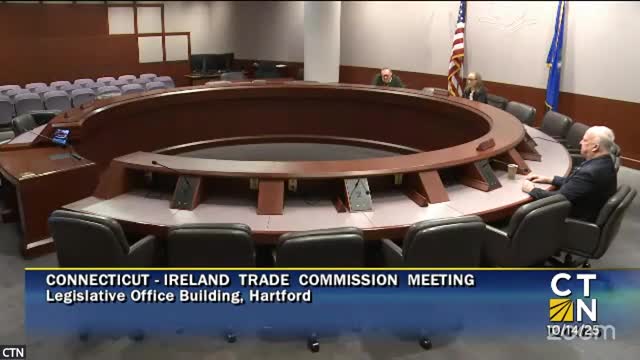Quinnipiac professor outlines Connecticut–Ireland higher-education links, student-exchange opportunities
Get AI-powered insights, summaries, and transcripts
Subscribe
Summary
At an October meeting of the Connecticut Ireland Trade Commission, Dr. Christine Keneally described existing academic ties between Connecticut colleges and Irish universities, student-fee differences, enrollment trends and on-campus programs; commissioners asked about visa and commercial implications and next steps for outreach.
At an October meeting of the Connecticut Ireland Trade Commission, Dr. Christine Christine Keneally, director of Ireland’s Great Hunger Institute and professor of history at Quinnipiac University, described existing and potential higher-education links between Connecticut institutions and colleges in Ireland and Northern Ireland.
Keneally told commissioners that Ireland’s university landscape is much smaller and more centralized than the United States, with eight universities in the Republic of Ireland (including University College Dublin, Trinity College Dublin and University of Limerick) and a different funding model in which most institutions receive state support through the Higher Education Authority. She summarized key differences that affect student exchanges: most undergraduate degrees in Ireland are three years instead of four; domestic students pay modest administrative charges (about €3,000 in the most recent year, reduced by €500 in the latest budget); and overseas students generally pay substantially higher tuition (typically €10,000–€25,000 depending on program and level).
Keneally described programs and links already active in Connecticut: Sacred Heart University operates a campus in Dingle that can host visiting students; Fairfield University maintains a long-standing relationship with the University of Galway; the University of Connecticut offers several Irish programs and Irish-language instruction; and Quinnipiac sends roughly 37–38 students each year on semester exchanges (down from about 70 before COVID, Keneally said). Quinnipiac also maintains relationships that place students in Trinity College law courses and has ties with University College Dublin’s medical school. Keneally said Quinnipiac’s Arnold Bernhard Library holds a substantial Irish research collection and that Quinnipiac’s Ireland’s Great Hunger Museum closed in 2020, its collection currently not on public display.
Keneally also described non‑university programs that connect U.S. students with Ireland, including the Council on International Educational Exchange (CIEE) and specialized short-term providers; she cited an internship model run by CIEE as an example that could be expanded both ways. Keneally raised anecdotal concerns about U.S. visa-screening and H‑1B uncertainty, saying those factors appear to deter some students and scholars from coming to the United States. She also noted a May 2025 statement by Ireland’s minister for education, James Lawless, offering to welcome academics who wish to relocate from U.S. universities — a policy Keneally described as controversial among some Irish academics.
Commission members asked about the commercial side of academic links and about recent enrollment changes; Representative Steven Meskers and others offered to help facilitate outreach to U.S. institutions and to Connecticut’s economic-development office for any firms or academic partners seeking contacts. Commissioners and several members also highlighted opportunities to expand programs through community colleges, high-school pathways and alumni networks.
The presentation concluded with a public invitation from Keneally to visit Quinnipiac’s Irish collection and current exhibitions on 19th‑century relief efforts (including Indigenous aid to Ireland in 1847).
